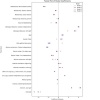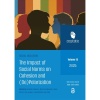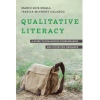INCLUSIVITY
Inclusivity norms to counter polarization in European societies
Description
European societies and the European Union are increasingly divided due to financial crises, migration-related issues, increased disinformation in social media, and the current COVID-19 pandemic. Evidence of widening cleavages and conflicts can be found along multiple group lines, such as ethnicity, social class, religion, sexual, and political orientation. This polarization, broadly defined here as a process by which society shows growing divisions between groups with contrasting opinions and beliefs about social issues, often results in adverse feelings, avoidance, conflicts, and even violence. Polarization in Europe goes hand in hand with detrimental societal and political challenges, such as the rise of populist leaders, growing anti-EU sentiments, and increased hate speech and hate crimes. Polarized conditions are bound to enhance barriers and distance between social groups, lessen trust and social cohesion, and ultimately boost intolerance, discrimination, and political instability for years to come.
To prevent the harmful consequences of polarization for the social tissue of European communities, and to effectively improve tolerance, cohesion, and cooperation between Europeans, we take a novel perspective by focusing on inclusivity norms, which are social group norms that promote equality-based respect, dialogue, and unity. Our project rigorously examines the emergence and potential of such inclusivity norms to increase contact and cooperation between opposing groups across multiple group divides, and their power to thereby decrease and prevent new consequences of polarization on a societal level. We use an innovative interdisciplinary and mixed-methods approach, which combines a cross-European survey, laboratory experiments, qualitative interviews, cultural consensus analysis, social network analysis, and an evaluation of school-based interventions to study how inclusivity norms are adopted and how they can change individuals’ attitudes and behavior toward opposing groups.
Our approach advances research on current European challenges in three important ways. First, we provide a unique, evidence-based approach to polarization in Europe, an issue that underlies major and interrelated European challenges as indicated in prior research (e.g., intolerance and integration problems, disinformation in social media, populism). We propose that inclusivity norms have the potential to enhance the capacity of European societies to improve relations between opposing groups across multiple lines and thereby address these European challenges. Second, our experimental and network approach to inclusivity norms goes beyond the state of the art by uncovering the relational nature of norm transmission, as well as the conditions under which inclusivity norms amplify tolerance, contact, and cooperation, leading to a better understanding of how to meet these critical challenges. To this end, we will implement a theoretically informed and rigorously examined intervention to reduce and gradually overcome polarization in Europe. Third, our project will result in unparalleled open-access empirical data on similarities and differences in inclusivity norms between European countries and salient groups within European countries, including EU separatist movements. These data will have the great potential to show the most effective ingredients and effectiveness-optimizing conditions in promoting cohesion in Europe.
Our project will result in unique knowledge on how to optimize the transmission and adoption of inclusivity norms in contemporary Europe. Furthermore, by creating an international hub of research on inclusivity norms, facilitated by implementing workshops, conferences, a multilingual website specifically designed for practitioners and non-experts, and ongoing collaborations with these and other stakeholders, we will transfer valuable knowledge to both stakeholders who facilitate European cooperation and the general public.
Team
The research is conducted by an international consortium of five teams of the University of Osnabrück (PI: Maarten van Zalk), the University of Utrecht (PI: Eva Jaspers), FernHagen University (PI: Oliver Christ), the Jagiellonian University in Krakow (PI: Marcin Bukowski), and the Autonomous University of Barcelona (PI: Miranda Lubbers).
Publications
-
THE RELATIONAL TOLL OF POLITICAL INVOLVEMENT IN POLARIZED TIMES: RELATIONSHIP DECAY WITH ACTIVISTS' PERSONAL NETWORKS (2025). American Behavioral Scientist. DOI
-
THE IMPACT OF SOCIAL NORMS ON COHESION AND (DE)POLARIZATION (2025). Social Inclusion, 13: 10984. DOI
-
A PERSONAL NETWORK STUDY OF INFORMAL POLITICAL CONVERSATION IN CATALONIA: FIELDWORK REPORT OF WORK PACKAGE 3 OF THE INCLUSIVITY RESEARCH PROJECT (2024). Report. COALESCE Lab, Universitat Autònoma de Barcelona. OSF
-
REVIEW OF "QUALITATIVE LITERACY: A GUIDE TO EVALUATING ETHNOGRAPHIC AND INTERVIEW RESEARCH" (2023). Perifèria. Revista de Recerca i Formació en Antropologia, 28 (2): 240-250. DOI





